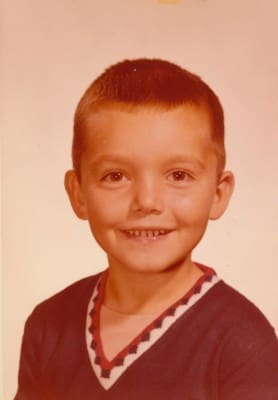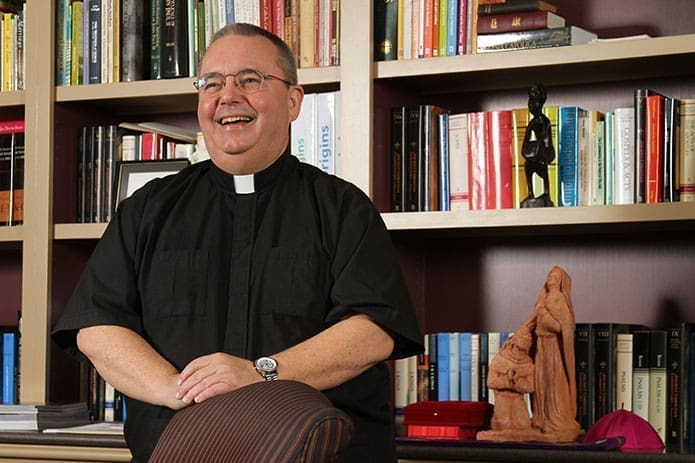 Photo by Michael Alexander
Photo by Michael AlexanderAtlanta
From A Life Of Service, New Bishop Finds New Role
By ANDREW NELSON, Staff Writer | Published April 11, 2013
ATLANTA—David Talley had accepted he was never going to be a priest.
He had entered the seminary but left after three semesters. A few years later, he spent a year at a Jesuit novitiate, but also left.
He found a career, instead, in social work, serving poor families living in Atlanta’s often violent housing projects. His eyes were set on earning his master’s degree in social work from the University of Georgia.
But while he was conducting research for it, a simple question from an Athens priest changed his life.
“It was real powerful, a lightning bolt. From that point on, there were no more questions,” he said of the 1981 encounter.
On April 2, Bishop David P. Talley, 62, was ordained as only the third auxiliary bishop in the history of the Archdiocese of Atlanta and the first native Georgian.
The oldest son in the Talley family, his mother a nurse and his father a surgeon, he says he was “a wandering soul.”
Shaped By The Turmoil Of 1968
As a boy, he grew up in North Augusta, S.C., as his father attended medical school. The family then moved to Columbus, Ga., where he graduated from Hardaway High School. He said he was “an introvert, who was often on the sidelines” during high school.
His parents later divorced. He was the oldest of five children, along with a half brother from his father’s second marriage. The family is close; he returns to Columbus a couple of times a year to “watch a movie, and laugh and eat together at the Macon Road barbeque shack,” said his sister.
The world seemed to be aflame in the turmoil of 1968, when he finished high school.
“(Martin Luther) King died, (Robert) Kennedy died, the riots in Chicago,” said the bishop. “It was an extraordinary part of my life growing up. Dr. Martin Luther King is a hero of mine. He was a prophet of mine.”
Indeed, Bishop Talley left his family’s Southern Baptist church after a dispute with a church elder over whether segregation was biblically sound.
“My parents tried to get me to go back, but I wouldn’t go back. So I walked away from church when I was 14 because of racism, or the lack of participation in the great movement of my time, the civil rights movement,” he said.
His sister, Meg Burkhardt, said her brother has always been a “thinker.”
“David was not superficial, not one day,” she said. “He’s always a thinker, always had been.”
He enrolled in Auburn University where the family expected he’d be a premed student. He left before earning his degree. With a low lottery number during the Vietnam War draft, he enlisted in the Army, but a boot camp injury kept him out of the military.
Arts, Poetry Draw Him To The Catholic Church
Catholic friends around this time introduced him to Thomas Merton’s autobiographical “Seven Storey Mountain” and it propelled him to pore over other Catholic classics, from Thomas Aquinas to St. Bonaventure.
“It was a catalyst that changed my life,” he said.
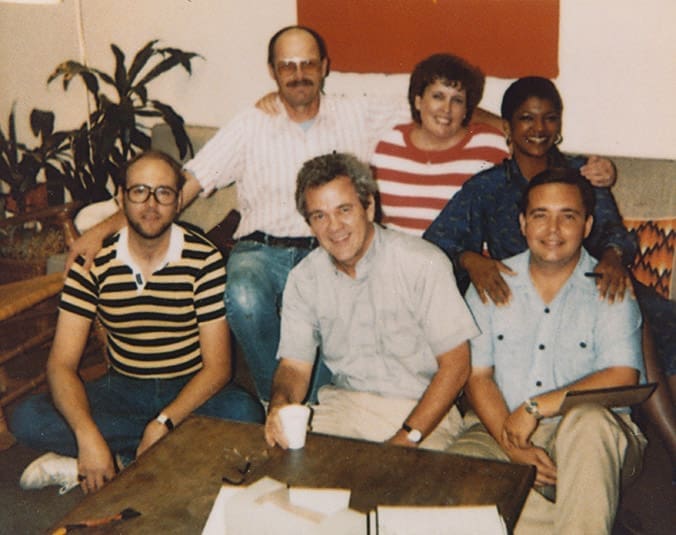
Newly ordained Bishop David Talley, front row, far right, spent time as a seminarian in 1987 working at a soup kitchen hosted at St. Luke’s Episcopal Church in Atlanta.
Merton introduced him to new ways to see the world. To love the arts and to have a questioning mind “can be aspects of a search for God. I had not heard that before,” he said. “The intellectual life and the aesthetic life were blessings from God. They were not to be shied away from, but to be manifest and magnified. I had not heard that before in relation to spirituality, in relation to Christianity. That was inspiring to me.”
He returned to Auburn University to study philosophy. In February 1975, he became a Catholic after talking with a priest at St. Mary Church, in Opelika, Ala.
Quickly afterward, he entertained the idea of becoming a priest. But his two initial efforts at religious life suggested it wasn’t for him and that social work would be his career.
Social work appealed to him as a way to be “an instrument of healing and justice and reconciliation,” he said. Spending time in impoverished parts of Atlanta, as he worked for the Fulton County Division of Family and Children Services, he had to protect children in emergency situations, among other duties.
But that conversation in 1981 with the pastor of St. Joseph Church, Athens, Father Richard Kieran turned his life around. It wasn’t an unusually profound question, but simply, have you ever thought of becoming a priest? And he continues to live the faith that sprang from that question.
The meeting was for research on a major paper the graduate student was writing, exploring how suffering is dealt with therapeutically and spiritually.
Within minutes, Father Kieran stopped the interview. “He said he wanted to ask me a question, ‘Have you ever thought about being a priest?’”
“Yes,” Talley responded.
“I believe you are called,” the priest said.
“It was real powerful, a lightning bolt. He got on the phone and called the archbishop’s office and said, ‘I have someone I want you to meet.’ He set up an appointment like that.”
And from that moment on, “there were no more questions” about his vocation, said Bishop Talley.
“From The Priest’s Dwelling”
It wasn’t a complete surprise to his mother. She told him the day he was ordained a priest how before his parents were married, his mother and father felt drawn to the church by listening to Bishop Fulton Sheen’s broadcasts and considered becoming Catholic. But his mom stopped as she knew her family would “disown her.” At the suggestion of her priest, she prayed.
“She went in, before she was married, and prayed that her first son would be a priest. She told me that the day of my ordination. She chose my middle name after that night, Prescott, which means from the priest’s dwelling,” Bishop Talley said.
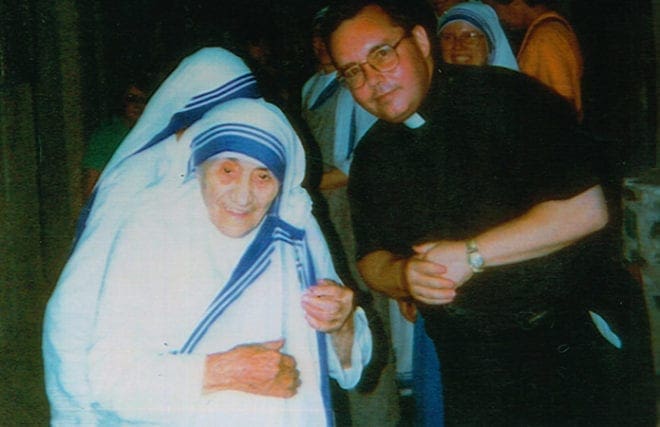
During his studies in Rome, Father Talley befriended many members of the Missionaries of Charity. Here he greets Blessed Mother Teresa of Calcutta, who founded the order.
He attended St. Meinrad Seminary, in St. Meinrad, Ind., and was ordained at the Cathedral of Christ the King, Atlanta, in 1989 by Atlanta Archbishop Eugene Marino, SSJ. In 1998, he studied for his doctorate in canon law at the Gregorian University, Rome, a Jesuit university.
“He’s a servant, beginning and end, and everything in the middle,” said Burkhardt, 50, a counselor at a technical college in Columbus.
Photos in his large office at St. Brigid Church, Johns Creek, will be in his new office at the Chancery. Among them are his heroes, Pope John Paul II, Dorothy Day, Martin Luther King Jr. and Mother Teresa. He listens to the music he grew up with in the 1960s, from Simon and Garfunkel to Joni Mitchell, with opera, classical and jazz thrown in. While he reads as many as 10 books at a time, most of his focus these days is spent on “bishop’s stuff,” he said.
A book he recently finished was the journal of theologian Father Yves Congar about the Second Vatican Council.
Bishop Talley said he is a “product of the council,” especially two council documents, the Pastoral Constitution on the Church in the Modern World (“Gaudium et Spes”) and the Dogmatic Constitution on the Church (“Lumen Gentium”).
As the church marks a half-century since the council’s opening, Bishop Talley said its message still holds true: “to bring life and redemption to those who are broken of heart.”
Roll-Up-His-Sleeves Leadership
He’s been the spiritual leader at three large parishes in the archdiocese: most recently, at St. Brigid Church, Johns Creek, but also at St. John Neumann Church, Lilburn, and St. Thomas Aquinas Church, Alpharetta.
He’s shepherded some innovative rebuilding at his parishes, paying attention to the needs of the whole community. At the Lilburn church, the parish installed an altar and an ambo, where the Scripture is read, that lowers to make it accessible to those with physical disabilities; the tabernacle was built lower for access by any extraordinary minister of communion using a wheelchair.
An emergency during his time as pastor there was the 2009 flood. Marti McLeer remembered a morning phone call from then Msgr. Talley with news of water flooding the St. John Neumann preschool building. Later, the two stood in the parking lot to watch the water rise and wreck the ground floor. A flag hanging from the building depicted a colorful image of Noah’s ark. There were 65 children and their parents who relied on the preschool.
“It didn’t look promising,” she said. “It was really a big mess.”
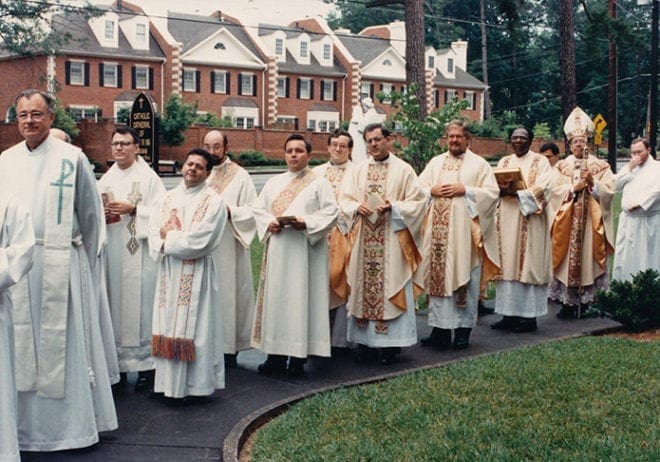
Rev. Mr. David Talley, fifth from left, waits for his ordination Mass at the Cathedral of Christ the King, Atlanta, to begin. Atlanta Archbishop Eugene Marino, SSJ, ordained him on June 3, 1989.
Once the cleanup began, the parish came together, with the pastor in work clothes.
“We all rolled up our sleeves and got to work. We are all wet, dirty. He’s right there with us,” said Deacon Bill Marten.
Once the preschool was set up in the former social hall, Catholic Charities Atlanta was invited to take over the top floors of the building to serve nearby clients.
“That’s his love. That says a lot about him. He’s connected to social services, the disability ministry that the archdiocese has. It just says a lot about him. He’s always looking to reach out,” said Deacon Marten.
When he was assigned to another parish, the parish grieved.
“We had all come together and we were moving forward as a parish, with a lot of hope and anticipation and then he was moved. It was tough,” he said.
Asked what he hoped people would say about him, Bishop Talley said, “He was one of us. A member of the family. I’d hope they’d say, he’d love.”
People With Disabilities Show Him How To Live Gospel Love
An annual weekend that has long been reserved on Bishop Talley’s calendar is the springtime Toni’s Camp for children with disabilities.
He said the late Toni Miralles, who pioneered the camp and the ministry, would approach new parochial vicars at St. Jude Church, Atlanta, to try to “throw in her hook every time she saw one and hoped one would bite” to serve her ministry to those with disabilities.
“And I did,” he said. St. Jude was his first assignment.
“The first time I went to Toni’s Camp (I knew) I would never stop. And I haven’t,” he said.
“From a kid who was an introvert, who was often on the sidelines watching, not really understanding how to get inside this or that favored group, I already had a built-in empathy for those who are on the margins,” he said.
As much as the kids have fun at the getaway weekend, the relationships challenge him and help him spiritually.
“At 23 and 24, reading Merton, I was inspired by this intellectual life, the life of the poet, the scholar; I enjoy thinking, I enjoy reading, and I enjoy the sharing of ideas. That’s a vulnerable point. That’s a place where my arrogance, my sinfulness, can get in the way of my love. And the disabled community help you to see that,” he said.
“Gospel love is not about the idea; it is about the willing of the heart. So they helped me with my sinfulness, my arrogance,” he said.
Most people who are considered successful learn to create something of value, he said. But the children at Toni’s Camp have a “different set of values, a different world view,” he said. The campers care about being “accepted, cared for, being able to show love,” he said.
“The disabled of the Lord are on the margins. We put them there because it’s not comfortable to be in the same place with those who have different skills and aptitudes. The Lord touched my heart” with the campers, he said.
Dan Mathews is the director of Camp Twin Lakes, which hosts the weekend camp for people with disabilities. The future bishop celebrated the Mass where Mathew’s developmentally disabled daughter was baptized.
“To me, he is the epitome of what a vicar of Christ should be,” he said.
There is a “gentle guidance” to people he interacts with, Mathews said. “He is truly a remarkable man,” he said.
A Dream Of St. Francis Encourages Him
Bishop Talley is returning to the administrative hub of the nearly 1 million strong Atlanta Archdiocese. From 1998 to 2003, he served in various roles at the Chancery, from vocations director and chancellor to judicial vicar of the Metropolitan Tribunal.
The auxiliary bishops will help Archbishop Wilton D. Gregory to keep in touch with the priests and parishes around the 69-county archdiocese. Bishop Talley and Auxiliary Bishop Luis R. Zarama will each be responsible for a region of the archdiocese, to stay in contact with priests, deaneries, and with parish life there. The regions they will serve will be where they have not previously served as pastors.
Also, like Bishop Zarama, Bishop Talley will have oversight of various Chancery departments. Those for Bishop Talley include the vocations office, the priest personnel board, the committee for the ongoing formation of priests, Catholic Charities Atlanta, and ecumenical outreach.
Early in his priesthood, Bishop Talley spent five years in Rome, studying canon law and earning a doctorate. He admits the time wasn’t easy, taking courses in Italian, being away from friends and family. A wooden statue he treasures came out of that experience.
“One night I had this dream, I saw this vision of Francis, who was part of my adult conversion experience, kneeling, and Clare giving him courage,” he said.
“It was a powerful, powerful, personal gift in my dream.”
“The next time I had a chance, I went to Assisi, and found one of the famous artists there and in my broken Italian, (speaking) with his wife, I modeled what I saw in the dream. He created that for me. It is a one-of-a-kind statue,” he said.
In it, St. Clare leans in prayer and support over the kneeling Francis.
“I wanted to be Francis of Assisi, but I don’t have his heart,” Bishop Talley said. “But neither did he. He was a man torn by many passions. Clare, that’s what her name means light, clarity. This told me that it’s OK to have a broken heart, a heart that has been rent, because there will always be those there to support you.”
